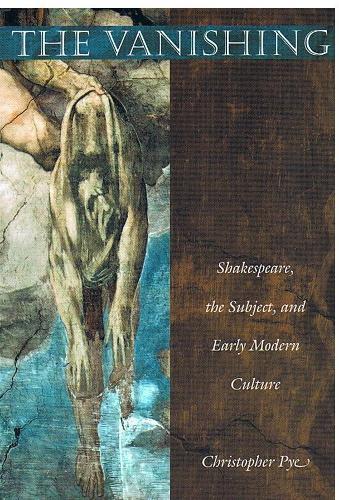Overview
In ""The Vanishing"" Christopher Pye combines psychoanalytic and cultural theory to advance an innovative interpretation of Renaissance history and subjectivity. Locating the emergence of the modern subject in the era's transition from feudalism to a modern societal state, Pye supports his argument with interpretations of diverse cultural and literary phenomena, including Shakespeare's ""Hamlet"" and ""King Lear"", witchcraft and demonism, anatomy theatres, and the paintings of Michelangelo. Pye explores the emergence of the early modern subject in terms of a range of subjectivizing mechanisms tied to the birth of a modern conception of history, one that is structured around a spatial and temporal horizon - a vanishing point. He also discusses the distinctly economic character of early modern subjectivity and how this, too, is implicated in our own modern modes of historical understanding. After explaining how the aims of New Historicist and Foucauldian approaches to the Renaissance are inseparably linked to such an historical conception, Pye demonstrates how the early modern subject can be understood in terms of a Lacanian and Zizekian account of the emerging social sphere. By focusing on the Renaissance as a period of remarkable artistic and cultural production, he is able to illustrate his points with discussions of a number of uniquely fascinating topics - for instance, how demonism was intimately related to a significant shift in law and symbolic order and how there existed at the time a ""demonic"" preoccupation with certain erotic dimensions of the emergent social subject. ""The Vanishing"" should be of interest to students of Shakespeare and early modern culture, Renaissance visual art, and cultural and psychoanalytic theory.
Full Product Details
Author: Christopher Pye
Publisher: Duke University Press
Imprint: Duke University Press
Dimensions:
Width: 16.20cm
, Height: 2.10cm
, Length: 23.60cm
Weight: 0.594kg
ISBN: 9780822325109
ISBN 10: 0822325101
Pages: 277
Publication Date: 18 August 2000
Audience:
Professional and scholarly
,
Professional & Vocational
Format: Hardback
Publisher's Status: Active
Availability: In Print

This item will be ordered in for you from one of our suppliers. Upon receipt, we will promptly dispatch it out to you. For in store availability, please contact us.
Reviews
Pye's contribution lies in his willingness to engage with history as a discourse with its own conditions instead of taking it as the unexamined ground or container of the events, movements, and texts in its domain. <br>--Julia Reinhard Lupton, Modern Language Quarterly
Christopher Pye's elegantly written and argued The Vanishing is a terrific book. It could by itself renew interest in the merits and possibilities of psychoanalytic theory not only for reading early modern culture but for literary studies more generally. - Karen Newman, author of Fashioning Femininity and English Renaissance Drama Pye moves with great concision, delivering dazzling insights and startling conjunctions. The Vanishing thus makes an important intervention in early modern studies, recalling the promise of 'theory' to advance our understanding of questions of history and representation. -Jonathan Goldberg, author of Desiring Women Writing: English Renaissance Examples
Author Information
Christopher Pye is Professor of English at Williams College. He is the author of The Regal Phantasm: Shakespeare and the Politics of Spectacle.




